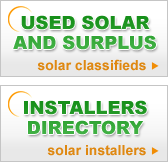Residential renewable energy tax credit:
-This is a tax credit offered to residents of Rhode Island who have
installed a photovoltaic system, solar heating system, wind energy
system and/or geothermal heat pump.
-These renewable energy technologies are eligible for a 25% tax credit.
-The maximum incentive amount for photovoltaics, solar space heating
and wind systems is $15,000. The maximum incentive amount for solar
hot water systems and geothermal technologies is $7,000.
Renewable energy certificate incentive – People’s
Power and Light:
-People’s Power and Light is a non-profit organization that
buys renewable energy credits from photovoltaic systems and small
wind-energy systems.
-The renewable energy credits collected from PV and wind systems are
combined with renewable energy credits from low-impact hydro and biomass
and sold together as “New England GreenStart”.
Renewable energy credits from photovoltaic and small wind energy systems
are purchased from the system owner by the Energy Consumers Alliance
of New England at a rate of $0.03 per kilowatt hour for a period of
3 years.
Property tax exemption for renewable energy systems:
-Renewable energy systems in the state of Rhode Island are exempt
from property taxes.
-Eligible systems include solar photovoltaics, solar water heat, solar
space heat, wind, biomass and hydroelectric.
Residential solar property tax exemption:
-All residential renewable solar systems including solar water heat,
solar space heat and solar PV are exempt from property taxes.
-Some residential solar systems may only be assessed at the value of
a conventional system.
Renewable energy sales tax exemption:
-In the state of Rhode Island certain renewable energy systems and technologies
are exempt from sales tax.
-Eligible technologies include solar PV, solar water heat, solar space
heat, solar thermal electric, wind, geothermal heat pumps and solar
pool heating, as well as some equipment used with these technologies.
Solar thermal rebate program:
-Residents of Rhode Island who own solar water heating, solar space
heating or solar thermal systems that are tied to National Grid are
eligible to receive a 15% rebate of total project costs up to $1,500.
-Participants must share their water heating usage data for a 12 month
period to qualify for this rebate program.
Net metering:
-In the state of Rhode Island, customers who generate electricity
by using solar or wind technologies are eligible for net metering.
-Customers that generate excess electricity during a billing period
have the option to have the net excess generation (NEG) credited to
the next billing period at a rate that is slightly less than the utility’s
retail rate or the customer may opt to receive compensation in the
form of a monthly check for NEG.
Residential renewable energy tax credit:
-This personal tax credit allows the taxpayer to claim a credit of
30% of expenditures including labor costs and installation of qualified
residential solar-electric systems, solar water heating systems or
fuel cells. Small wind-energy systems and geothermal heat pumps can
also be accredited for.
-Solar-electric systems and solar water heaters have a maximum incentive
of $2,000 if placed in service before 2009. There is no maximum incentive
for systems placed after 2008.
-The excess amount of the federal tax credit may be carried forward
to the next taxable year if it exceeds tax liability.
-This can be carried forward until 2016, but after that, it is unknown
if the unused credit will be able to be forwarded.
Residential energy conservation subsidy exclusion:
-This is a personal exemption of 100% of energy conservation subsidies
provided by public utilities.
-The value of a purchase or installation of any energy conservation
measure by a customer such as solar water heat, solar space heat or
photovoltaics will not be included in the customer’s gross income.
-Customers of an electric utility company, who participate in the
utility’s energy conservation program, may receive a rate reduction
of electricity furnished or a nonrefundable credit against the purchase
price of the electricity on each monthly electric bill.
Energy-efficient mortgages:
-This is a federal loan program where homeowners can use EEM (energy-efficient
mortgages) to finance renewable energy technologies in a home.








